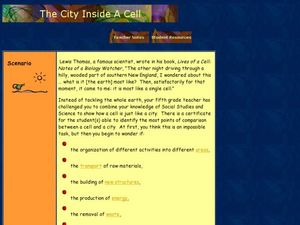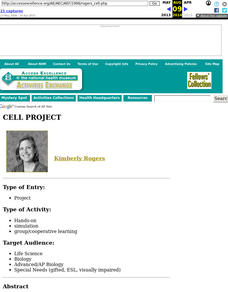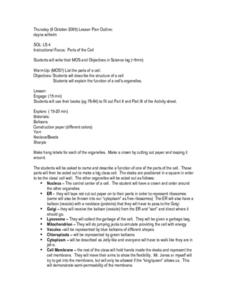Curated OER
Biology: Understanding Cellular Organelles
Students distinguish the differences between Prokaryotic and Eukaryotic cells. Using microscopes, they examine a variety of plant and animal cells. Working in groups, they draw and label plant and animal cells and show the mathematical...
Curated OER
The City Inside a Cell
Students compare cell structure to the structure of a city. In this cell structure lesson, students investigate differences and similarities between cell structure and city structure. Students create a 3-dimensional, edible model of a cell.
Curated OER
Cells
In this biology activity, students use the clues given at the bottom of the sheet to complete the crossword puzzle on cells. There are 22 clues to solve in the puzzle on cells.
Curated OER
The Cell
Students visualize plant and animal cells, explain the parts of a cell and their functions and distinguish plant cells from animal cells. Working Students, in groups, must present a particular portion of a cell to the entire class.
Curated OER
Introduction to Human Anatomy & Physiology
If the only support you are in search of is lists of vocabulary terms, this presentation may fit the bill. Slides simply list terminology. These categories are included: hierarchy of structural organization, cell functions, cell...
Curated OER
Cell Me What?
Young scholars compare and contrast the characteristics of robots and cells. For this biology lesson, students examine the parts and function of cell organelles. They create a visual representation of their cell/robot analogy.
Curated OER
7.012 Fall 2004 Section Self-quiz
This quiz just looks neat! It has two cell diagrams for biology class members to label. They also describe the function of each organelle. A prokaryotic and eukaryotic cell are displayed for them to compare, and then they fill in the...
Curated OER
Cell Project
Students investigate cells. They discover what cells are, where they are found, what they do and what they are made of. They construct a giant cell that is posted on the bulletin board.
Curated OER
Cell Observation Exercise
Students take measurements of the distance between the objective and the slide when in focus with each objective. They determine the diameter of the field of view at each power in order to determine the size of the cells being observed.
Curated OER
Regents High School Examination: Living Environment 2009
Emerging ecologists need a full understanding of life, from the inner workings of a cell to the complex relationships among organisms. This examination is meant to assess high schoolers after an entire year course on the living...
Curated OER
Regents High School Examination: Living Environment 2007
Environmental science enthusiasts show what they know at the end of the year by taking this full-fledged final exam. They answer multiple choice, graph interpretation, and essay analysys questions, 73 of them in all. Topics range from...
Curated OER
Organelles
Students explore the functions of major eukaryotic organelles. They compare and contrast prokaryotic and eukaryotic cells. Given diagrams and drawings, students take turns drawing structures, discussing their function, and labeling...
Curated OER
Cell Cookie Lesson Plan
Students review the structure and fuctions of plant and animal cells. They use various types of materials such as sugar cookies and cake frosting for this activity.
Curated OER
The Structure and Function of Cells: Making Biology Fun
Investigate life below a microscope, and cells and discover the differences between plant and animal cells.
Curated OER
Final Exam Practice - General Biology
A 17-page practice final exam for a college-level introductory biology course is contained in this resource. Matching and short answer questions cover every topic that you would expect to teach during an advanced biology course including...
Curated OER
The Incredible, Edible Cell
Students discover organelles and the functions organelles perform in cells. In this biology lesson, students create model cells using Jell-o, then dissect their "cell" to examine the parts that create a cell. Students create a diagram as...
Curated OER
Cell Structure and Function
Students compare the organelles present in plant and animal cells. In this biology lesson, students create an analogy to easily remember their assigned organelles. They also research their function and write a creative story.
Curated OER
Cell Cycle, Mitosis and Meiosis
Seventh graders describe the processes involved in mitosis and meiosis. In this life science instructional activity, 7th graders create chromosome models using strings and beads. They play a jeopardy team game at the end of the unit to...
Curated OER
A View of the Cell
For this cell worksheet, students will match 13 vocabulary words relating to cells to the correct definition. The cell vocabulary words cover all the parts of the cell plus eukaryotes, and prokaryotes.
Curated OER
Eukaryotic Cell Structure
In this cell structure learning exercise, students review the structure and function of eukaryotic cells. Students also compare and contrast an animal cell with a plant cell. This learning exercise has 15 fill in the blank, 8 true or...
Curated OER
Biology: Make a Model Cell
Students compare and contrast plant and animal cells and then create a model of the latter. They visit Websites to view the cells and answer questions about them. In pairs, students create cell models using plastic baggies, syrup,...
Curated OER
The Cell - Internet Activity
In this cells worksheet, students click on the links to learn about the plant and animal cells complete a comparison chart and answer short answer questions about it. Students complete 10 questions total.
Curated OER
Cell Works
Students identify the different parts of the cells and their functions. In this biology instructional activity, students create an analogy of a cell and its organelles. They make a poster and present it to class.
Curated OER
Parts of the Cell
High schoolers examine plant and animal cells to observe the organelles present in the cell, to match the function of each to the organelle on a cell model and to build a model of the plant or animal cell.

























